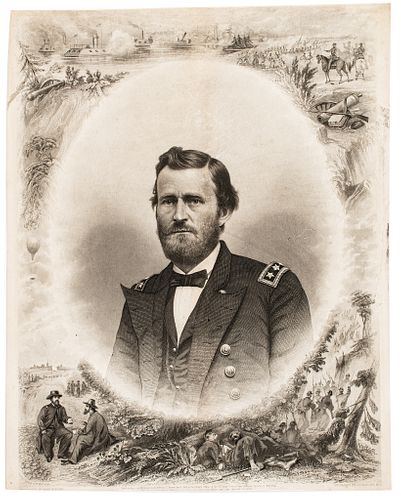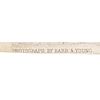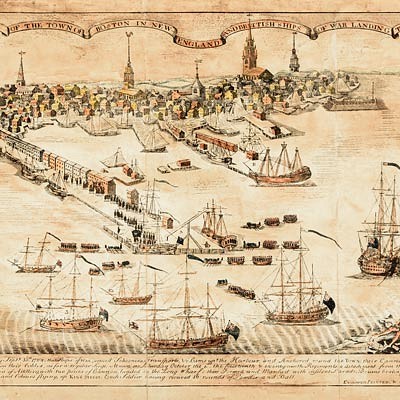1864 Ornate Engraved Print of Lieutenant General Ulysses S. Grant by J.C. Buttre
Lot 234
Categories
Estimate:
$180 - $240
Absentee vs Live bid
Two ways to bid:
- Leave a max absentee bid and the platform will bid on your behalf up to your maximum bid during the live auction.
- Bid live during the auction and your bids will be submitted real-time to the auctioneer.
Bid Increments
| Price | Bid Increment |
|---|---|
| $0 | $10 |
| $200 | $20 |
| $300 | $25 |
| $500 | $50 |
| $1,000 | $100 |
| $2,000 | $200 |
| $3,000 | $250 |
| $5,000 | $500 |
| $10,000 | $1,000 |
| $20,000 | $2,000 |
| $30,000 | $2,500 |
| $50,000 | $5,000 |
| $100,000 | $10,000 |
| $200,000 | $20,000 |
| $300,000 | $25,000 |
| $500,000 | $50,000 |
About Auction
By Early American History Auctions
Mar 20, 2021
Set Reminder
2021-03-20 12:00:00
2021-03-20 12:00:00
America/New_York
Bidsquare
Bidsquare : Autographs-Colonial-Political-Americana
https://www.bidsquare.com/auctions/early-american-history-auctions/autographs-colonial-political-americana-6509
330 Lots of Rare, Historic Autographs, Americana, Civil War Era, George Washington, Abraham Lincoln, Slavery & Black History, Revolutionary War Era, Colonial America, Federal Period, War of 1812, Colonial Currency, Indian Peace Medals & more... Early American History Auctions auctions@earlyamerican.com
330 Lots of Rare, Historic Autographs, Americana, Civil War Era, George Washington, Abraham Lincoln, Slavery & Black History, Revolutionary War Era, Colonial America, Federal Period, War of 1812, Colonial Currency, Indian Peace Medals & more... Early American History Auctions auctions@earlyamerican.com
- Lot Description
Civil War Prints
1864 Engraved Print of Lieutenant General Ulysses S. Grant
1864-Dated Civil War Period, Ornate Engraved Print of Lieutenant General Ulysses S. Grant, by J.C. Buttre, Crisp Very Fine.
This engraved print of General Ulysses S. Grant by J.C. Buttre measures about 10.5" x 13" and features Grant in his Union General's military uniform bordered by stylized depictions of events during the Civil War such as the Battle of Hampton Roads in the upper left. Other scenes include: at bottom left; Grant and Confederate General John C. Pemberton discuss the terms of the Surrender of Vicksburg while a white flag waves in the background, at bottom center; two dead soldiers, and on the right are troops moving through a Wilderness area. Also shows at left, a hot-air balloon, possibly conducting surveillance; plus a Naval battle with multiple Ironclad warships. There is some even light toning and the print has a nice even appearance for display.
Ulysses S. Grant (born Hiram Ulysses Grant; April 27, 1822 - July 23, 1885) was an American soldier and politician who served as the 18th president of the United States from 1869 to 1877. Before his presidency, Grant led the Union Army as Commanding General of the United States Army in winning the American Civil War. As president, Grant was an effective civil rights executive who worked with the Radical Republicans during Reconstruction to protect blacks and reestablish the public credit. He is credited with rebuilding the U.S. Navy, which at the time lagged behind other world-power navies, such as those of Great Britain and Spain.
Raised in Ohio, young Grant possessed an exceptional ability with horses, which served him well through his military career. He was admitted to West Point, was considered its best horseman, and graduated in 1843. Grant served with distinction in the Mexican-American War. In 1848, he married Julia Dent, and together they had four children. Grant abruptly resigned his army commission in 1854 and returned to his family, but lived in poverty for seven years. During the Civil War, he joined the Union Army in 1861, and led the Vicksburg campaign, which gained control of the Mississippi River in 1863. After Grant's victory at Chattanooga, President Abraham Lincoln promoted him to Lieutenant General. For thirteen months, Grant fought Robert E. Lee during the high-casualty Overland Campaign and at Petersburg. On April 9, 1865, Lee surrendered to Grant at Appomattox. A week later, Lincoln was assassinated, and was succeeded by President Andrew Johnson, who promoted Grant to General of the Army in 1866. Later Grant openly broke with Johnson over Reconstruction policies; Grant used the Reconstruction Acts, which had been passed over Johnson's veto, to enforce civil rights for recently freed African Americans.
A war hero but a reluctant politician, Grant was unanimously nominated by the Republican Party and was elected president in 1868. As president, Grant stabilized the post-war national economy, created the Department of Justice, and prosecuted the Ku Klux Klan. He appointed African Americans and Jewish Americans to prominent federal offices. In 1871, to help reduce federal patronage, Grant created the first Civil Service Commission. The Liberal Republicans and Democrats united behind Grant's opponent in the presidential election of 1872, but Grant was handily re-elected. Grant's Native American policy had both successes and failures. In foreign affairs, the Grant administration peacefully resolved the Alabama claims against Great Britain, but the Senate rejected Grant's prized Caribbean Dominican Republic annexation. Corruption in federal departments was rampant; four of Grant's appointed cabinet members resigned under scandal. But Grant also appointed cabinet reformers, for example, for the prosecution of the Whiskey Ring. The Panic of 1873 plunged the nation into a severe economic depression that allowed the Democrats to win the House majority. In the intensely disputed presidential election of 1876, Grant facilitated the approval by Congress of a peaceful compromise.
In his retirement, Grant was the first president to circumnavigate the world on his tour, meeting with many foreign leaders. In 1880, Grant was unsuccessful in obtaining the Republican presidential nomination for a third term. In the final year of his life, facing severe financial reversals and dying of throat cancer, he wrote his memoirs, which proved to be a major critical and financial success. At the time of his death, he was memorialized as a symbol of national unity. Militarily evaluated, Grant was a modern general and "a skillful leader who had a natural grasp of tactics and strategy." Historical assessments of Grant's presidency have improved over time. Grant was ranked 38th in 1994 and 1996, but ranked 21st in 2018. Several modern historians, although critical of Grant's defense of Orville Babcock and Secretary of Interior Columbus Delano, have emphasized Grant's presidential accomplishments including the Alabama Claims settlement, protection of African Americans and Indians, and the first Civil Service Commission. In 1872, Grant created Yellowstone, the world's first national park.
Our Auction Contents:
Black History & Slavery: (Lots 1 - 63)
Abraham Lincoln Related: (Lots 64 - 74)
Historic Autographs: (Lots 75 - 235)
Colonial America: (Lots 236 - 261)
Revolutionary War: (Lots 262 - 304)
George Washington Related: (Lots 305 - 306)
Early American Guns & Weapons: (Lots 307 - 318) - Shipping Info
-
Early American provides in-house worldwide shipping. Please contact us directly if you have questions about your specific shipping requirements.
-
- Buyer's Premium



 EUR
EUR CAD
CAD AUD
AUD GBP
GBP MXN
MXN HKD
HKD CNY
CNY MYR
MYR SEK
SEK SGD
SGD CHF
CHF THB
THB















